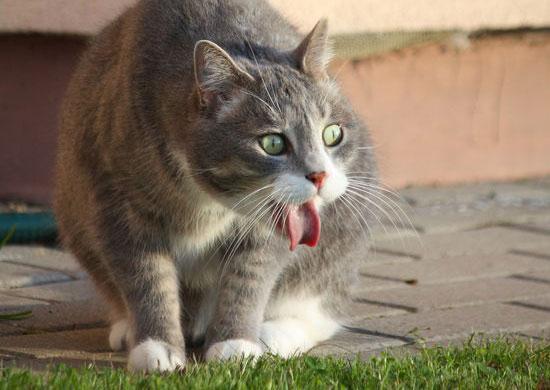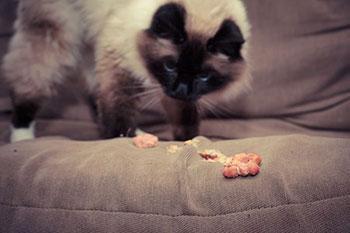This content is archived from the Feline Nutrition Foundation
Answers: Let's Talk About Cat Barf
- Updated: Monday, May 06, 2019 01:05 PM
- Published: Saturday, June 28, 2014 06:17 PM
- Written by Elisa Katz, DVM
 My kitties eat a raw cat food diet and sometimes barf up the food they just ate. It happens with different kinds of meat, so I don't think it's a particular food. Why do they do this and is there anything I can do to stop it? I have also caught the cats eating what's barfed up!
My kitties eat a raw cat food diet and sometimes barf up the food they just ate. It happens with different kinds of meat, so I don't think it's a particular food. Why do they do this and is there anything I can do to stop it? I have also caught the cats eating what's barfed up!
Many people may confuse vomiting, commonly referred to as barfing, with regurgitation. From your question, it sounds as if your cat may actually be regurgitating rather than vomiting the raw cat food. Vomiting is a lot more common in cats than regurgitation in my opinion. However, if the action happens within 30 minutes to 2 hours after eating, it can be regurgitation. Let's start by explaining the difference. Regurgitation is a passive action where undigested food is expelled from the esophagus. The regurgitated food usually looks much the same as when it was eaten, and is often in a cigar-shaped form when brought up. It may be accompanied by liquid. Regurgitation is usually effortless, and does not involve heaving or forceful abdominal contractions. Vomiting, on the other hand, is usually accompanied by retching and thrusting of the head. The vomit will be acidic and have a sour smell. It can also have a yellow liquid, which is bile from the stomach, mixed with the digested material.
If your cat regurgitates only occasionally, once or twice a month, then it may not be a cause for concern. If it happens with frequency, then you should have your cat checked by a veterinarian to see if there is an underlying medical cause. There are several conditions and diseases that may cause problems with a cat's esophagus; these conditions must be ruled out as causes for chronic regurgitation. Any defect in the esophagus can cause regurgitation. This could be a result of a congenital defect such as a persistent aortic arch, in which a blood vessel wrapped around the esophagus causes a stricture. Strictures can also result from trauma or acid reflux caused by other diseases. Any chronic vomiting can lead to esophageal problems due to acid contact with the esophagus. Neurologic conditions, hormonal imbalances, cancer or a foreign object in the esophagus can all cause regurgitation. Most cats that regurgitate infrequently don't have a medical condition, and the owner can often manage the situation with some simple changes.
Some cats will regurgitate food simply because they have eaten too much at one sitting. Their stomachs are full and food backs up into the esophagus. How much is too much can vary quite a lot. What one cat can eat without problems may be way too much for another. Try feeding just a small amount, a couple of tablespoons or an amount about the size of a walnut. Wait thirty minutes. If it doesn't come back up, then feed some more. Your cat may just require smaller, more frequent meals.
 Regurgitating meat chunks is not uncommon. If your cat does this, try feeding smaller and fewer chunks at one sitting. Since you mentioned that your cat would regurgitate different foods, it is unlikely that it is a food intolerance. For others experiencing this problem, care should be taken to note if regurgitation only occurs with a particular food or foods. Some owners report that liver, in any amount, causes their cats to bring their food back up.
Regurgitating meat chunks is not uncommon. If your cat does this, try feeding smaller and fewer chunks at one sitting. Since you mentioned that your cat would regurgitate different foods, it is unlikely that it is a food intolerance. For others experiencing this problem, care should be taken to note if regurgitation only occurs with a particular food or foods. Some owners report that liver, in any amount, causes their cats to bring their food back up.
Consider the temperature of the raw cat food. If it is too cold, it may come back up. Try warming it by placing it in a Ziploc-type bag, then in a bowl of warm – not hot – water for a few minutes prior to serving. Do not microwave it, as this just cooks the food.
Cats will sometimes head to the water bowl immediately after eating a meal. Lots of liquid after a meal could cause regurgitation. Observe your cat's behavior to see if this is part of the pattern. You can try removing the water bowl during meals to prevent this. Put down fresh water after an hour.
Try to reduce stress during meals. Cats that are afraid other cats will steal their food may gobble it down fast and bring it right back up. If necessary, feed cats in separate rooms to reduce competition.
Additional Reading
Answers: Why Won't My Cat Eat?
Answers: What Dry Food Does to Your Cat's Gut
As for your other cats eating what one regurgitates, that's not unusual at all. The food has not been digested and they would see nothing wrong with eating it.
Note: Feline Nutrition provides feline health and nutrition information as a public service. Diagnosis and treatment of specific conditions should always be in consultation with your own veterinarian. Feline Nutrition disclaims all warranties and liability related to the veterinary advice and information provided on this site.
Dr. Elisa Katz, DVM, is a graduate of Ohio State University and is the owner of Natural Pet Animal Hospital in Bourbonnais, Illinois. She practices holistic and integrative medicine focusing on proper diet and nutrition. Dr. Katz shares her home with four kitties and one dog.




